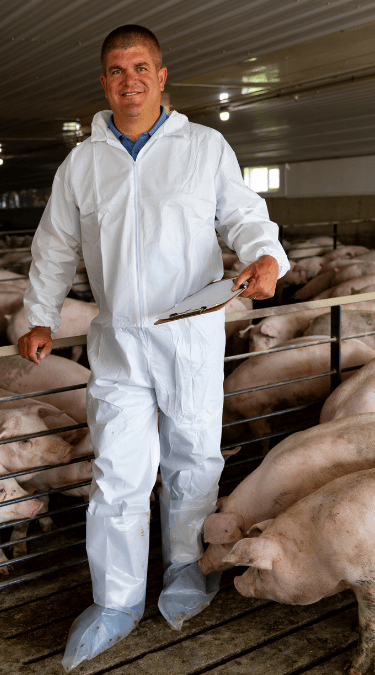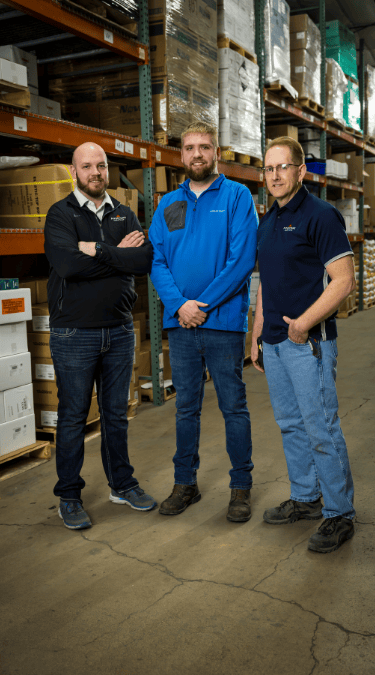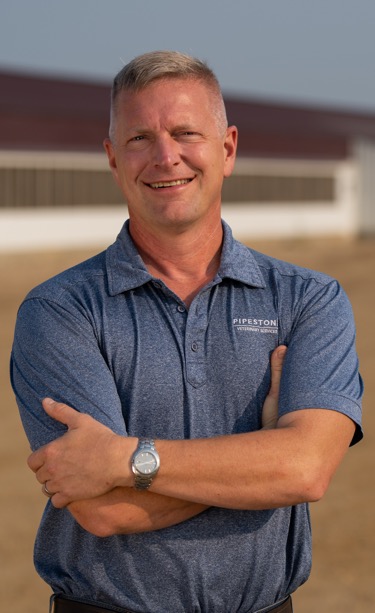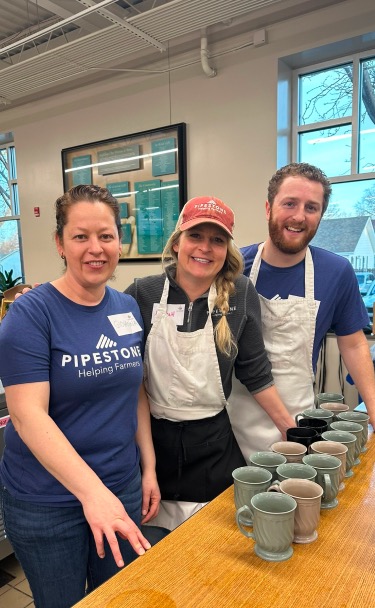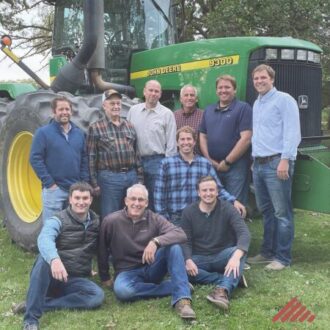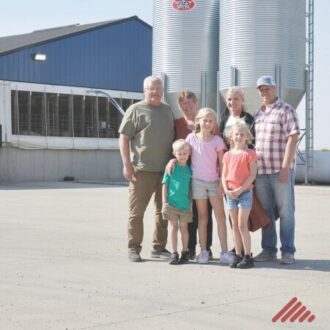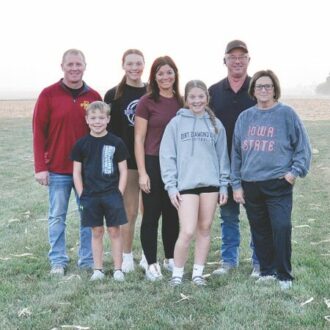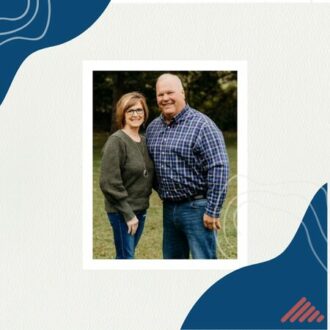Dan and Bonnie Hansen began farming in Carroll, Nebraska, in 1977 with little more than faith, determination, and a dream. Gradually they built a small but resilient operation that now finishes 26,000 hogs annually, row crops, and even an on-farm feed mill. “We started from scratch,” Dan said. “And we’ve been growing for 40 years—together.”
Today, their son Tony and his wife Melissa, along with their three kids, are working to carry that legacy forward, blending family values with modern swine practices while planning for the next generation. “God has opened doors for us. Every step, whether it was expanding or transitioning management, He has provided the right people and the right timing,” Tony said.
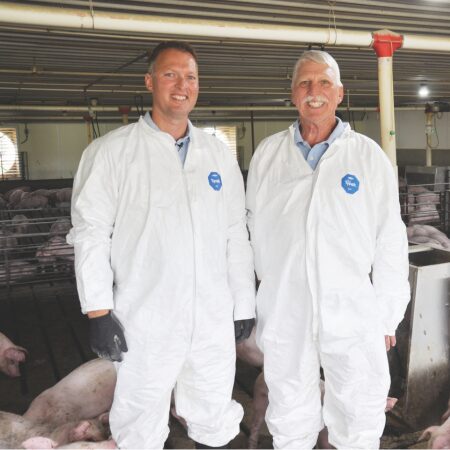
The Hansens had always sold hogs to Hormel, but after that market closed, a former contact reached out. “About a year later, we got a call that Pipestone Partners had some shackle space and were looking for a family farm,” Tony recalled. After meeting with Terry Wolters, the family agreed to ship about 26,000 hogs a year. “That was a huge answer to prayer for us,” he said. “Shortly after we signed on with Pipestone Partners, we were actually in need of a different nutritionist. After looking into the company a bit more, we found out Pipestone has a nutritional company and a vet service side, and every door just seemed to open up for us. As a small family farm in northeast Nebraska, there aren’t a lot of other pork producers to network with.”
“What I’ve noticed after working with them is everyone is just so excited, and they have so much passion for what they’re doing and the department they’re in. They want to help us succeed in our business, and it helps their business succeed,” Tony added.
For years, the Hansen Farms proudly ran their own sows, but older barns and continuous flow systems made maintaining herd health increasingly difficult. “Continuous flow used to work years ago, but it just doesn’t work anymore. Switching to an all-in, all-out system at the wean-to-finish barns has made a dramatic difference. Life-changing, business-changing move,” Tony said. Closing their sow farms and investing in a Pipestone-managed farm allowed the Hansens to access healthier pigs and more predictable outcomes. “The mental toll that disease takes on you when you own sows is huge. You’re working hard and doing everything right, but still falling short. Being part of a managed farm helped us get our lives back,” Tony added. Healthier pigs have improved performance and growth, and given the family the space to focus on refining their new wean-to-finish system.”
Feed, Health, and Hands-On Management
Feed quality and nutrition have been key to keeping the Hansens’ herd performing at its best as they settle into their updated system. Over the years, they’ve upgraded their on-farm feed mill—from a simple grinder mixer behind a tractor to a triple roller mill with automated monitoring—giving them control over particle size and ration consistency. “We constantly check our micron’s and adjust rations based on what we see in the barns and the needs of the pigs,” Tony explained. Working with Dr. Jon DeJong and the team at Pipestone Nutrition has helped them fine-tune rations for each stage of growth, using their own corn and locally sourced soybean meal allows flexibility to make adjustments whenever needed.
Veterinary support has also been a game-changer. “We’d always had a void in an on-farm vet—someone we could connect with who had our best interests in mind,” Tony said. Having a dedicated swine veterinary team has helped the Hansens strengthen biosecurity, monitor herd health, and make better management decisions. “Having someone like Dr. AJ Smit, who knows our operation and knows hogs, it makes a huge difference. Plus, raising healthy pigs makes pork production a lot more fun,” Tony added.
Building strong relationships and actively managing every detail allows the Hansens to focus on what matters most: the pigs. “Whether I talk to Jon, AJ, or anyone at Pipestone, I get the same quality info. They don’t just tell you what you want to hear—they tell you what works and what doesn’t,” Tony explained. “That gives us more time to be in the barns, and being there is still the best way to manage a herd.”
Faith, Family, and Community
Faith and family have always guided the Hansens’ approach to farming. “Jon and AJ would come down for barn visits, and they were always so polite and professional. I’m sure they got back in the truck and said, ‘We need to pray for that family—they’re struggling,’ Tony says with a laugh. “And I’m sure they did, that’s probably why we are where we are.” Both Dan and Tony appreciate how invested the Pipestone team is in the family’s success: “They want to see us succeed as people, and that’s pretty important to us.”
Working as a family has shaped the farm’s culture over their 40+ years. “If our employees are successful, I’m successful. If not, then I won’t be. And so, I treat them like family and with great respect,” Dan explained. That philosophy has built loyalty and long-term relationships—one employee has been with the farm for 25 years—and Tony carries the same approach. “We couldn’t do what we do without their help,” he said.
For the Hansens, faith and family are central, but they’re also part of a bigger picture—the health and vitality of their rural community. “The more successful smaller producers like us become, the longer our communities and small towns stay around. Schools, churches—it’s all connected,” Tony said. Producing high-quality pork responsibly also serves a larger purpose. “It’s a product that can be afforded most places in the world. That means a lot more people have something to eat, and that kind of makes a person feel good,” Dan added.
Planning for the Future
Looking ahead, both generations see their role as not just keeping the farm going, but raising the bar for those who will follow. “We want the next generation to see what’s possible and to understand the responsibility that comes with it,” Tony said. For the Hansens, high standards—whether in pig care, farm culture, or community impact—are non-negotiable.
Tony returned to the farm in 2010 and gradually stepped into a leadership role. Succession planning was made a priority, and the Hansens worked with trusted advisors to set the stage for a smooth transition. This careful planning allowed Tony and Melissa to confidently take on management of the hog operation while Dan and Bonnie remained involved.
“Succession planning is not easy, but it’s necessary,” Dan explained. “We want to make sure we are giving the next generation a chance to succeed.”
For Tony, owning and improving the farm isn’t just about today—it’s about creating opportunities for whoever might return in the future. “Owning a business is hard work, and it gives you drive and motivation, even on days when you don’t feel like it. When we make improvements, we make them for the long term, with the hope that the next generation can come back, continue the business, and grow it further,” he said.
Tony and Melissa look forward to growing Hansen Farms even further, but only in ways that align with their values. “Our ten-year goal is to make sure we are still doing what we’re called to do, and that’s to take care of the land and the livestock,” Tony said.
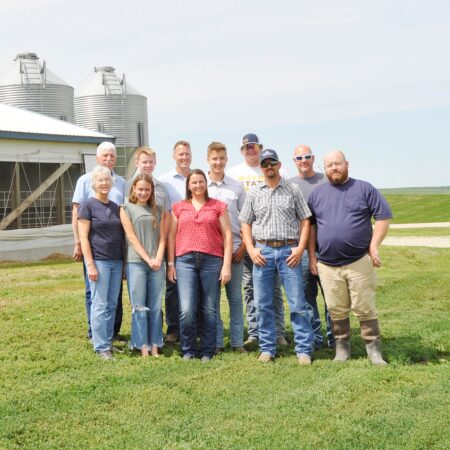
“If our employees are successful, I’m successful. If not, then I won’t be. And so, I treat them like family and with great respect,” Dan Hansen
